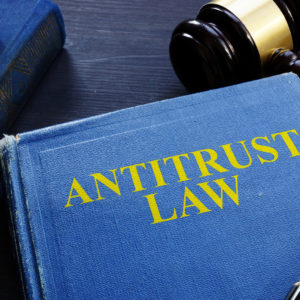Section 2 of the trust-busting Sherman Antitrust Act reads in part: “Every person (x) who shall monopolize, or attempt to monopolize, or combine or conspire with any other person or persons, to monopolize any part of the trade or commerce among the several States, or with foreign nations, shall be deemed guilty of a felony.” (x) (Person in the legal sense — meaning an individual or a corporation)
Yet decades have passed since the Justice Department has sought to prosecute a criminal monopoly case under this statute. That looks as if it is about to change.
Deputy Assistant Attorney General Richard Powers sent a shockwave through the highest echelons of the white-collar defense bar when he was on an American Bar Association panel in March. He was asked whether the Justice Department is now prepared to bring criminal cases under Section 2 of the Sherman Antitrust Act.
Power’s answer: “Yes, absolutely.”
He elaborated, “Congress made violations of the Sherman Act, both Section 1 and Section 2, a crime … and Section 2 is a felony just like Section 1. … Historically, the division did not shy away from bringing criminal monopolization charges, and frequently alongside Section 1 charges, when companies and executives committed flagrant offenses intended to monopolize markets.”
For decades, a pro-corporate mindset in the federal government has relegated Section 2 to the status of an unenforced law — dormant, but not dead.
Now, as unaccountable goliaths repeatedly demonstrate the widespread harms to workers, small businesses, consumers, communities and our very democracy that result from unchecked corporate power, the era of dormancy is about to be over.
Enforcement agencies are already flexing their antitrust muscles by bringing civil actions under Section 2 of the Sherman Act. Both the Justice Department’s case against Google (alongside Texas and 10 other states) and the Federal Trade Commission’s case against Facebook allege the respective corporations are engaged in illegal monopolistic practices.
The announcement that criminal cases are under consideration raises the stakes significantly. It means the Justice Department may bring criminal monopolization cases against corporate monopolists.
Criminal cases — which must be proven “beyond a reasonable doubt” — are more challenging than civil cases, which must be proven to a more relaxed “preponderance of evidence” standard. Such civil cases often are settled without alleged corporate wrongdoers even admitting they did anything wrong.
Both civil and criminal anti-monopoly cases put Standard Oil-style breakups on the table. But for a corporation, a criminal conviction also brings subsequent consequences such as court oversight — that is, corporate probation — the violations of which can bring down additional monetary penalties and court-imposed structural reforms, including further breakups.
Executives found guilty of conspiring in furtherance of a criminal monopolistic scheme, meanwhile, face a felony conviction with a maximum sentence of 10 years in prison.
The Justice Department’s antitrust chief Jonathan Kanter previously noted the “dearth of Section 2 case law addressing modern markets.”
They know they have work to do. The good news for corporate accountability advocates: They’re doing it.
Powers, in his remarks, noted that the Antitrust Division’s Criminal Section has 18 indicted cases against 10 corporations and 42 individuals, eight of which are CEOs or presidents — and that it also has more open grand jury investigations than it has at any time in the last 30 years: 146.
The corporate titans in the crosshairs of this fresh prosecutorial zeal will no doubt resist in every way they can — just as corporate titans of the Gilded Age resisted the Sherman Act’s original adoption.
In 1904, J.P. Morgan confronted President Theodore Roosevelt in the White House after the Roosevelt administration filed an antitrust suit against one of Morgan’s companies. Morgan (in Roosevelt’s recounting) proposed the government’s lawyers meet with the company’s lawyers to “fix it up” — that is, to end the lawsuit in a mutually amicable way (not unlike how the Justice Department too-frequently resolves corporate cases through leniency agreements instead of bringing cases to trial).
Roosevelt replied: “We don’t want to fix it up, we want to stop it.”
Ultimately, Roosevelt prevailed at the Supreme Court and Morgan’s trust was busted.
Let’s hope that Kanter and Power — today’s trust busters — are equally inclined to prefer busting trusts over fixing them up.

